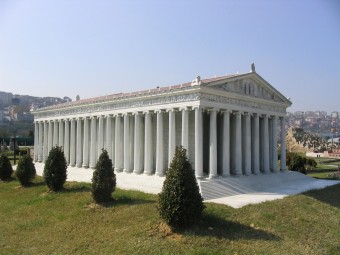This Day in History: July 21st
This Day In History: July 21, 356 BCE
 On July 21, 356 B.C.E., a man named Herostratus deliberately set fire to the Temple of Artemis at Ephesus in modern-day Turkey, a beloved architectural marvel that was one of the Seven Wonders of the Ancient World. Herostratus did not try to evade capture for his heinous act, rather he openly bragged about his crime, and his name became synonymous with a certain type of fame-seeker still very prevalent today.
On July 21, 356 B.C.E., a man named Herostratus deliberately set fire to the Temple of Artemis at Ephesus in modern-day Turkey, a beloved architectural marvel that was one of the Seven Wonders of the Ancient World. Herostratus did not try to evade capture for his heinous act, rather he openly bragged about his crime, and his name became synonymous with a certain type of fame-seeker still very prevalent today.
Ephesus was one of the great Hellenic cities situated on the coast of Asia Minor. The Goddess Artemis was the city’s patron deity, and her breath-taking marble temple (the first in the world) was larger than a football field. A temple to Artemis had stood on or near that spot since 800 B.C.E., and the Ephesians loved their Goddess and her sacred temple so much that when St. Paul came a-calling four hundred years later preaching the Gospel, he barely escaped with his life.
Enter Herostratus – a guy so desperate for fame he’d do anything to achieve it. He clearly wasn’t messing around, because he went whole hog and set fire to one of the most revered buildings in the ancient world. When the people of Ephesus saw the smoking ruins of the temple, Herostratus made certain they knew that he was the guy responsible.
The motive behind Herostratus’ seemingly senseless act of arson was recorded by the historian Valerius Maximus, “so that through the destruction of this most beautiful building his name might be spread through the whole world.”
To make sure Herostratus did not get his wish, the punishment for his arson was two-fold: execution and a little something called damnatio memoriae.
That second penalty was no doubt far more appalling to Herostratus. Damnatio memoriae, or “damnation of memory,” literally meant that all traces of the person being punished were removed from history. This meant that Herostratus’ name was stricken from all official records, and the mention of his name was forbidden, either by word or in writing, on pain of death. This was to deny him his lust for fame and glory.
In spite of the risk, Herostratus’ name and heinous act of arson was recorded by the historian Theopompus, and his name lived on as a term to describe someone who commits a crime for the sole purpose of the resulting notoriety. The term Herostratic fame means “fame at any cost”.
A modern example of someone who became herostratically famous would be Mark David Chapman, the killer of John Lennon. In his own words, Chapman’s sole purpose for gunning down the much-loved musician was that “the result would be that I would be famous; the result would be that my life would change and I would receive a tremendous amount of attention.”
Chapman was just in it to be a “celebrity.” If he had to murder a real celebrity to get there, so be it. That’s a classic Herostrat.
So, even with the Ephesians’ best efforts, Herostratus’ name did manage to live on.
If you liked this article, you might also enjoy our new popular podcast, The BrainFood Show (iTunes, Spotify, Google Play Music, Feed), as well as:
- The Mysterious Fate of the Library of Alexandria
- An Encyclopedia Finished in 1408 That Contained Nearly One Million Pages
- The Pyramids of Giza Were Originally White
- Hero of Alexandria and His Amazing Machines
| Share the Knowledge! |
|





One comment